Olive Oil Health Benefits – 2025 Update
A closer look at the powerful,...
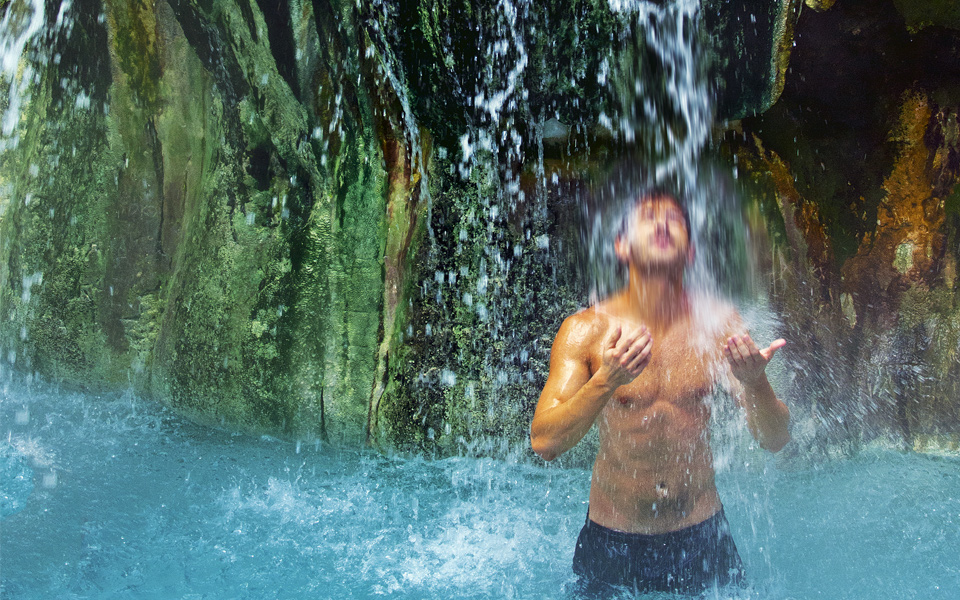
Pozar thermal waters
Located in the prefecture of Pella, northern Greece, at the foot of Mount Voras (Kaimaktsalan), 500m above sea level. Thermal waters here were being used during the era of Alexander the Great through the Roman and Byzantine periods. They retain a temperature of 37°C, which is how the spa got its name, Pozar, which means “beneath the fire” in Slavic. The verdant area around the spa features an impressive ravine.
The Toplitsa River, a thermal river formed by hot water springs that gush out at elevations of 360-390m above sea level, flows through the ravine. At the site, there is an old hydrotherapy center featuring 48 private baths, two indoor pools and two small hamam facilities, as well as a modern hydrotherapy center with eight 6-person pools.
A 50m swimming pool is located on a specially designed plateau and visitors may also enjoy the small thermal waterfalls along the river.
WATER TYPE
Medium-warm temperature, metallic, acidic.
HELPS WITH
Musculoskeletal and nervous system disorders, gynecological conditions, skin conditions.
• Loutraki, Aridea
(110km north-west of Thessaloniki)
• Tel. (+30) 2384.091.300
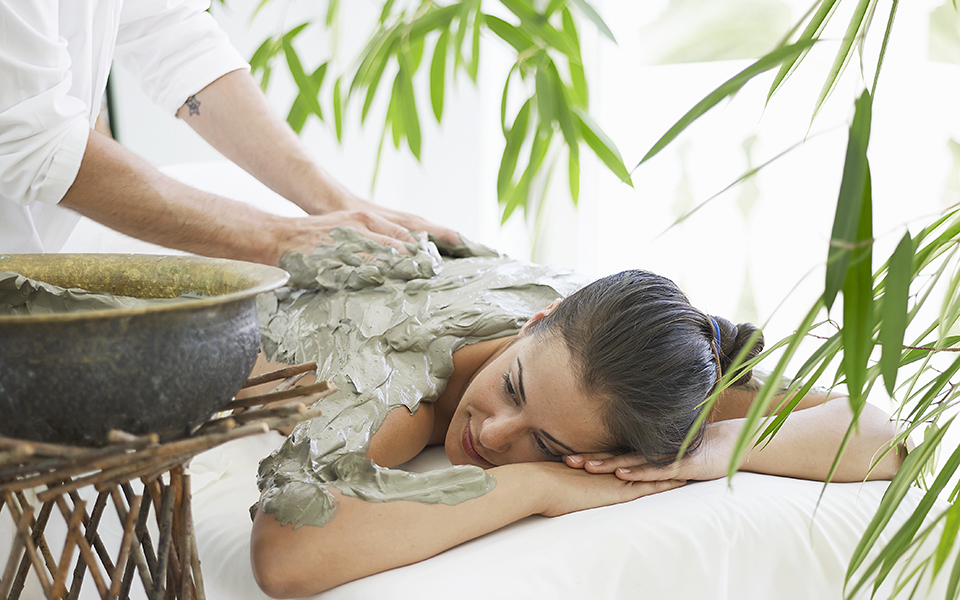
Thermae Sylla Spa & Wellness Hotel
Aidipsos is one of the most renowned spa resort towns of modern Greece. Its thermal springs gush up from depths of up to 3,000 meters at temperatures reaching 75°-85 °C. The best-known of these springs, the Thermae Sylla, was named after the Roman general Sylla (aka Sulla), who, according to the historian Plutarch, suffered from a case of gout while in Athens in 84 BC and traveled here for relief.
Nowadays, this spring’s waters (35°-50°C) are channeled to the five-star Thermae Sylla Spa and Wellness Hotel. Established in 1897 and revamped in 1999, the hotel is equipped with a spa that was further upgraded in 2012 to feature facilities for thermal therapy and thalassotherapy. Additional water (the temperature of which can be as high as 85°C) from the EOT (Greek National Tourism Organization) Springs is also used here.
WATER TYPE
Medium-warm, metallic, alkaline, chlorinated.
HELPS WITH
Musculoskeletal and nervous system disorders, skin conditions, gynecological conditions, as well as cosmetic use.
• 2 Posidonos, Edipsos, Northern Evia
(184km north-west of Athens)
• Tel. (+30) 2226.060.100
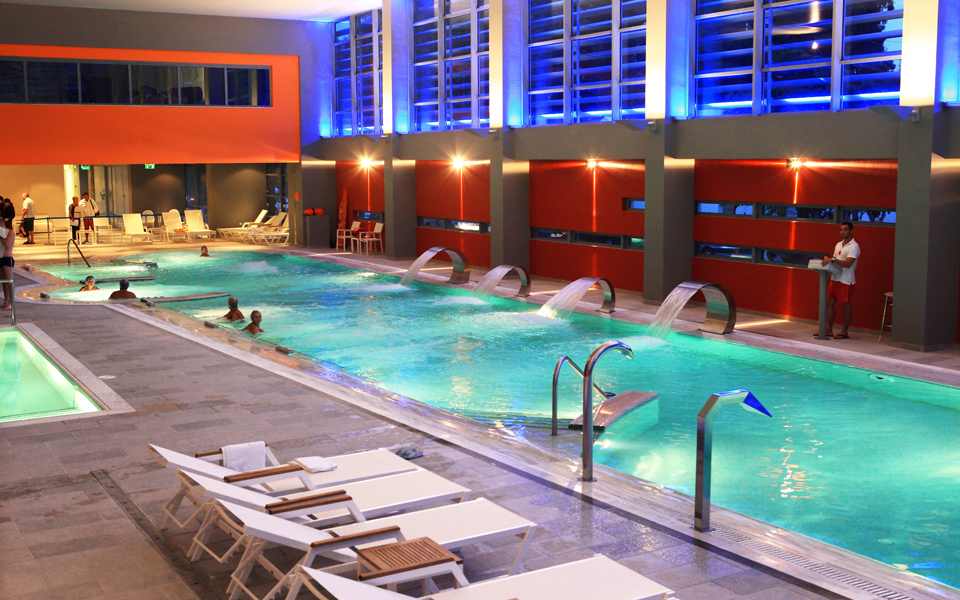
Loutraki Thermal Spa
WATER TYPE
Cool, metallic, alkaline, chlorinated, hydrosulfuric.
HELPS WITH
Musculoskeletal and nervous system disorders, skin conditions, gynecological conditions.
• 24 G. Lekka, Loutraki
(81km west of Athens)
• Tel. (+30) 2744.062.186
The ancient Greek historian Xenophon has written that Spartan soldiers would use the thermal springs of the ancient city of Thermes, believed to be today’s Loutraki in the prefecture of Corinth, for relaxation and reinvigoration following their battles.
The first organized spa here was launched in 1855, and in the early 20th century, Loutraki became Greece’s first spa destination. This seaside town, which also features a casino and is linked to Athens by train, is still regarded as the country’s main spa therapy destination, while many prominent figures have visited the facilities known today as the Loutraki Thermal Spa.
The complex was renovated in 2009, at which time the original 1934 building was joined to a new, larger structure housing modern facilities for spa therapy and thalassotherapy.
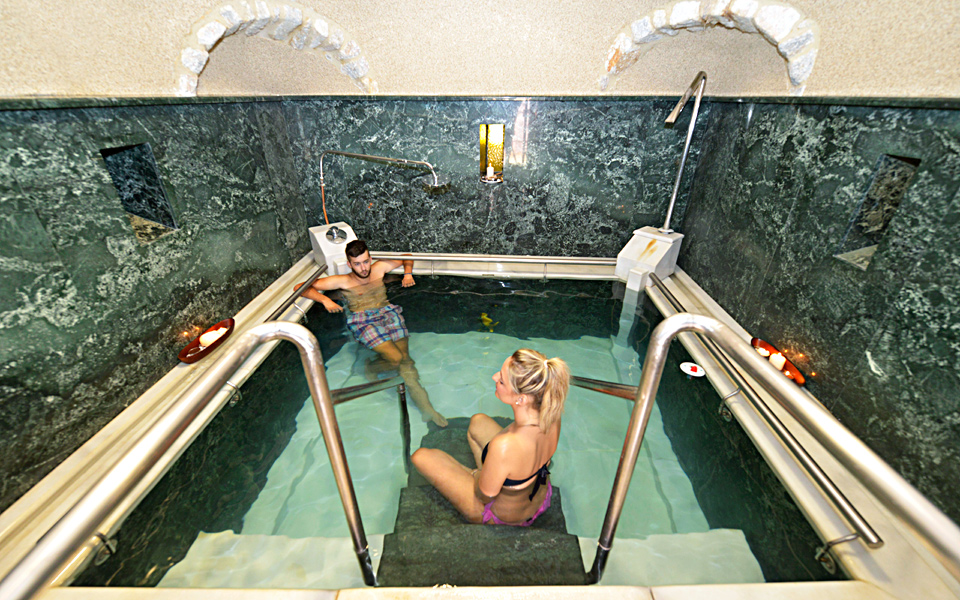
KRINIDES MUD BATHS
Originally a Byzantine-era spa, the village of Krinides was deserted after the 1923 Greek-Turkish population exchange and gradually became a mudflat. It is said that a sick buffalo was left by its owner in the mud for the wolves to devour, only to be spotted ten days later fully recovered and grazing the fields; this was how the thermal properties of the mud were discovered.
Nowadays, the Krinides Mud Baths, located 3km west of the village, ranks as Greece’s most popular mud therapy spa. Guests here first visit the center’s doctor, take a five-minute thermal shower to clean the skin and immerse themselves in the mud for 20 minutes. The cycle concludes with a second thermal shower, the only thing capable of washing off the Krinides mud.
WATER TYPE
Cool, metallic, alkaline, calcareous, magnesium- bearing, acidic, carbonated.
HELPS WITH
Musculoskeletal and nervous system disorders, gynecological conditions, skin conditions, cosmetic mud therapy.
• Krinides, Kavala
(147km north-east of Thessaloniki)
• Tel. (+30) 2510.516.162
• Open June- October
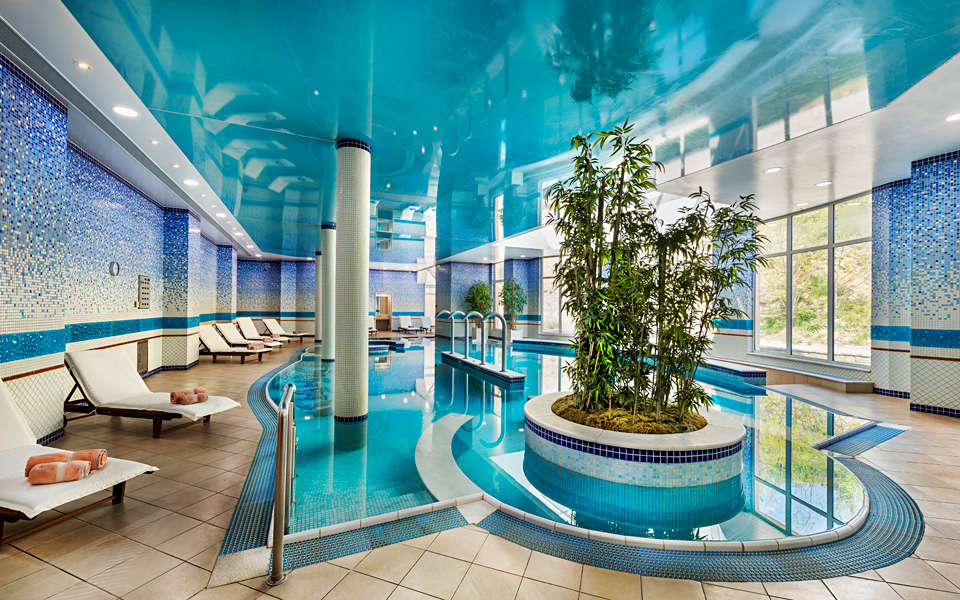
Thermae Platystomou Resort & Spa
WATER TYPE
Cool, high alkaline, medium sulfur presence.
HELPS WITH
Musculoskeletal, respiratory and nervous system disorders, skin conditions, gynecological conditions.
• Loutra Platystomou
(246km north-west of Athens)
• Tel. (+30) 2236.022.510
THERMAE PLATYSTOMOU RESORT & SPA
The spa at Platystomo, in the prefecture of Fthiotida, is located close to the village of Makrakomi, at the southern foot of Mount Othrys. Construction work initiated in 1929 to develop the spa (which opened in 1933) led to the discovery of the ruins of baths dating back to the Roman era, confirming the use of the region’s two thermo-metallic springs in ancient times.
The four-star hotel Thermae Platystomou Resort and Spa, located amid a richly vegetated and privately owned 78-hectare expanse, utilizes the thermal waters in its two indoor swimming pools.
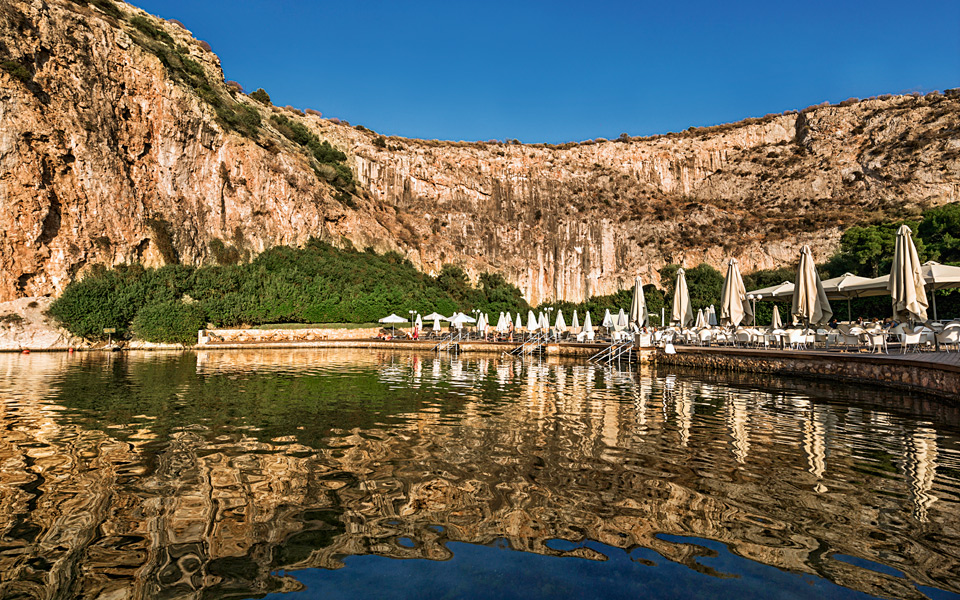
Vouliagmeni Lake
Vouliagmeni Lake, located in the heart of the Athens Riviera, is a spot of particular natural beauty. It features water stemming from sources between 50 and 100 meters deep at temperatures ranging between 22°-29°C, which makes the spot a year-round thermal spa.
From a distance, the lake’s water looks black; this is the result of dark-colored seaweed and a layer of mud that has formed on the lake bottom. The lake flows into the sea, which means the lake water has a brackish taste.
Small Garra rufa (or doctor fish), native to the lake’s waters, promise visitors a unique exfoliation experience by ridding the skin’s outermost surface of dead skin cells.
WATER TYPE
Cool, metallic, alkaline, chlorinated.
HELPS WITH
Musculoskeletal system disorders, skin conditions.
• Vouliagmeni
(25km south of central Athens)
• Tel. (+30) 210.896.2237
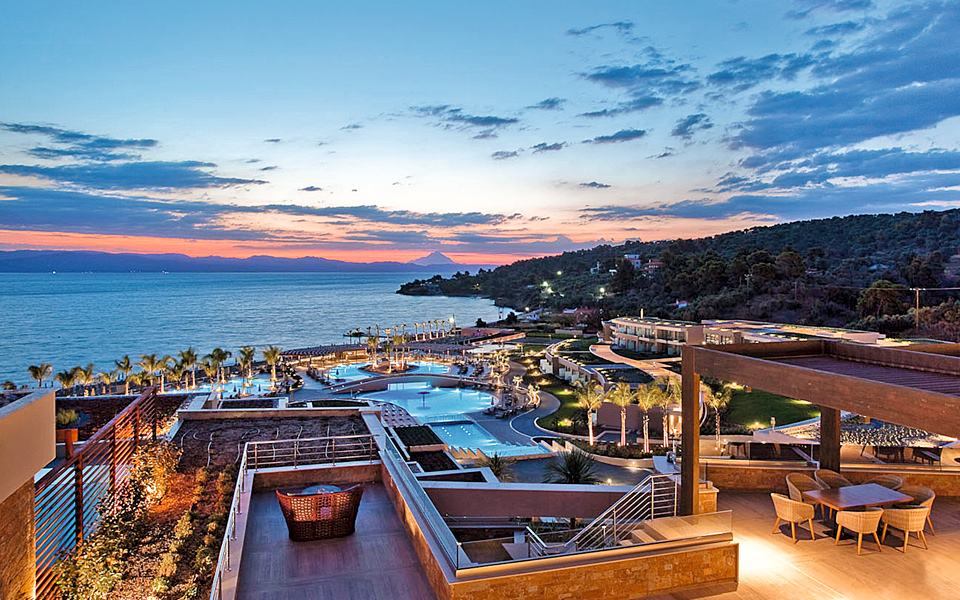
Miraggio Thermal Spa Resort
WATER TYPE
Cool, metallic, chlorinated, brominated and highly carbonated.
HELPS WITH
Musculoskeletal and nervous system disorders, peripheral vascular conditions, skin conditions.
• Kanistro, Paliouri, Halkidiki (123km south of Thessaloniki)
• Tel. (+30) 2374.440.000
• Open April-October
The thermal waters from the spring in Kanistro, on the Kassandra peninsula of Halkidiki, supply the Myrthia Thermal Spa at the brand new Miraggio Thermal Spa Resort, an ultra-luxury facility.
Located amid a rich green landscape in front of a 500m-long beach, the ultra-modern, two-level, 3,000-sq.m. wellness center offers both thermal and sea water for reinvigorating and cosmetic purposes in four different pools, each maintaining a different water temperature.
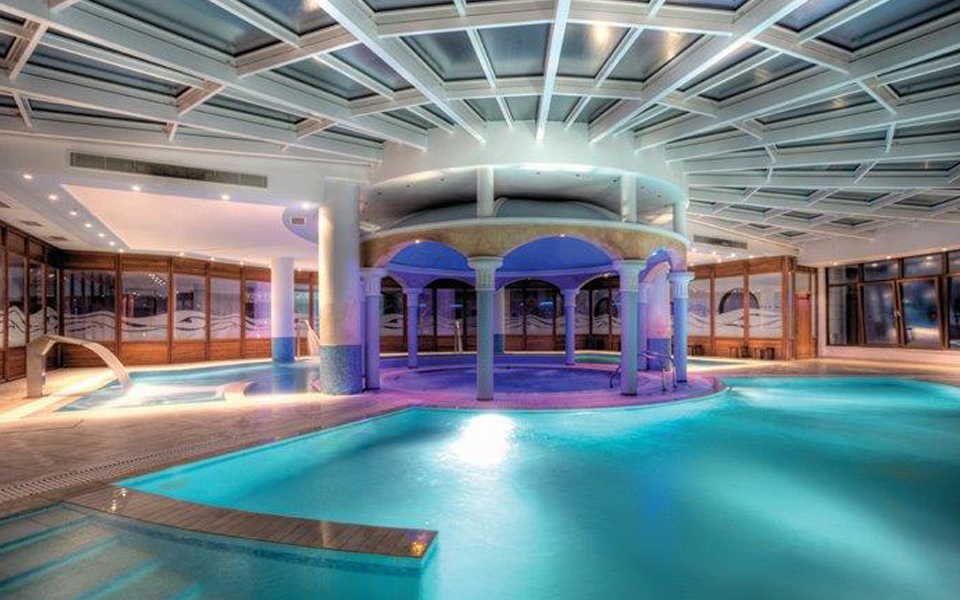
Galini Wellness Spa & Resort
WATER TYPE
Medium-warm, metallic, acidic, chlorinated, mildly carbonated, mildly hydrosulfuric, medium radon presence.
HELPS WITH
Musculoskeletal, nervous system disorders, skin conditions, gynecological conditions.
• 5 G. Vasiliadi, Kamena Vourla
(175km north-west of Athens)
• Tel. (+30) 2235.080.501-6
• Open April-October
Back in the early 20th century, Kamena Vourla in the prefecture of Fthiotida, was home to nothing more than swampland. However, the area possessed many thermal springs which prompted its development as a spa town.
Today, the spa at the five-star Galini Wellness Spa & Resort, a facility covering 3,000sq.m., offers visitors both indoor and outdoor swimming pools, filled with thermal waters from the region, and a separate indoor swimming pool filled with seawater for thalassotherapy, as well as specialized therapies based on the use of its thermal waters. These are thought to be among the few in Greece that, thanks to the presence of radon, exhibit radioactive properties.
A closer look at the powerful,...
Michiel Bakker, President of the Culinary...
We discover the healing properties of...